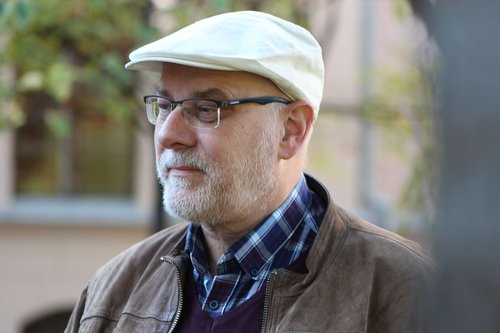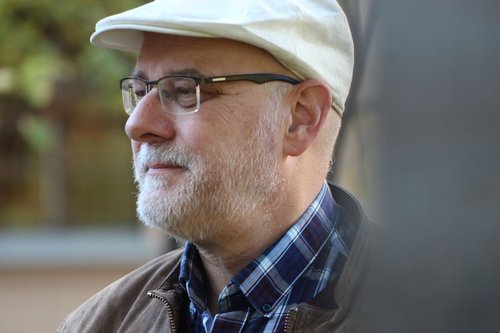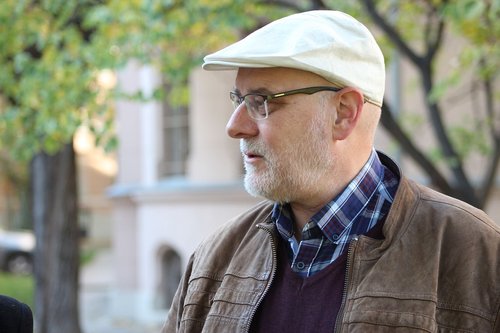Reformation Jubilee through Catholic eyes
2017. december 14., csütörtök“The excommunication of Martin Luther could have been resolved on the 500th anniversary of the reformation” said Máté András Tóth Catholic theologian, religious studies researcher and doctor at the Hungarian Academy of Sciences.
According to the head of the Department of Religious Studies at the University of Szeged Máté András Tóth, theological innovation is slow and stumbling - a good example is the interpretation of justification, which of common basis has only been agreed this year by the Catholic, Evangelical, Reformed and Methodist churches.

We live in the 500th year anniversary of the Reformation. In Protestant circles there are a lot of programs, events, exhibitions, concerts, worships, books that reminded us of the anniversary. There are memorial stamps, commemorative coins. Still, as a religious researcher, how do you see it from the outside of the Protestant communities, what can be seen from the jubilee celebration?
From my perspective on the anniversary, I can say that many conferences have been organized for the jubilee, some of which I gave lectures at as well. There are Protestant pastors of my friends, my students, who have half-humorously, half-seriously talked about the 500th anniversary like my catholic friends talked when they talked about Pope John Paul II visit to Hungary in 1991. They were saying that it is already too much fuss for everyone to be talking about this visit. I assume that my old priest-diplomat friend was right, when he told me that a year before the Pope's visit life had already stopped. I suppose that the celebration of the 500th anniversary of the Reformation requires so many cultural, diplomatic and other actions from those who carry a worthy commemoration on their shoulders that they are eager to celebrate the celebration and return to ordinary devotion. I also have a personal impression: I went to Debrecen with my family for a few days, I chose the destination. We saw fantastic exhibitions about the Reformation, exhibitions that can bring the reformation concepts closer to the average person.
From Catholic side, how do you see the anniversary?
I cannot see exactly what is happening within the Catholic Church on the 500th anniversary of the Reformation. I see, of course, interdenominational diplomacy, the strengthening of ecumenical dialogue, but I do not see any innovation that can be measured by the anniversary. Nowadays, when there are many crises in society, the minimal expectation would be that the theological differences would be minimized and for there to be less denominational chauvinism so that Christians could come closer together with greater courage.
So the Catholic, Evangelical, Reformed, and Methodist consensus in the doctrine of justification does not reach the level of "expected innovation"?
Theological innovation is too slow to reach official inter-denominational, diplomatic dialogue - and it is the same with these documents. Hans Küng wrote his doctoral dissertation on the doctrine of justification when I was born in 1957. He had already shown that there is no substantial difference between the Catholic and Protestant interpretations, or if there are discrepancies, they are not substantive differences. Then, it took sixty years in this accelerated world for the agreement which eliminates the obstacle from the way of unity to be reached,. But how many decades do we have to wait for couples in mixed marriages to be able to take part in a common eucharist?

At the Szeged International Biblical Conference, a protestant theologian wished to participate in the communion held by the Catholic liturgy and even though the main priest organizer would have let him, the priest who led the ceremony did not.
This is an important question, but from a theological viewpoint, it is not the teaching of the church on the eucharist, which hinders the common eucharist. I think there is a difference between Catholic and Protestant in terms of emphasis. In that story, too, it turned out that the Catholic priest could not make an exception out of loyalty to his church, and Catholics have had more difficulty here. The difficulty is caused by the fact that the Catholic Church does not recognize the priesthood of the churches of the Reformation. This is a problem that should be worked on.
As it was possible to resolve the papal bull of the orthodox schism, other bulls like the one against Martin Luther and other Reformers could have been solved as well. Historical research shows that it was not theological, religious, or ecclesiastical circumstances which occurred in the excommunications of the "Reformers saints." Today, I find it much more important for the church's to take prophetic steps towards unity, and then the theology can catch up. I am sincerely surprised that Pope Francis, who initiated brave, surprising and embarrassing ecclesial reforms, has not acted on this issue.
He is reading protestant writers for a year
"I decided that from the last year 31 October until this year 31 October, I will only read Protestant authors," we learned from András Máté-Tóth. He thought it was right to turn the 500th anniversary into an opportunity for self-education in order to better understand Protestant authors in the areas of religion, theology, and public life. He said he has had wonderful reading experiences: First, Ernst Troeltsch’s evangelical, sociological, theological, and political works, he also read Miroslav Volf's books of theology and sociology from a Croatian perspective. As well as Miroslav Volf's Book of Healing of Memories, which deals with the problem of remembrance and the question of how to process historical suffering, and the way in which a Protestant approach can blossom into life and society.

Pope Francis said in an ecumenical worship service in a Lutheran Church in Sweden on October 31st last year that Martin Luther was a smart man. Then he hugged the bishop of the Swedish Evangelical Church, who is –by the way- a woman. It was a smaller step than it could have been.
Such gestures are not unique but they are important. It can be trusted, and I do trust it, these things to point to unity. But it can only be demonstrated by a very serious document, and by church action.
Finally, let's talk about domestic things. There were two podium discussions in Budapest, one by a Lutheran and Reformed Bishop, and another by a Catholic and a Reformed Bishop. At the last one I felt a little bit that they avoided the situation of debate. What do you think about these discussions?
Unfortunately, I did not read one of their papers, but I consider this kind of dialogue important. It is best when the encounter is not political or diplomatic, but is a religious event. In the center of all Christian denominations is Jesus Christ, and the connection to him, worshipping him and imitating his actions: this is the primary task. If we can meet this way, that is progress and it is important.
Since you've just mentioned politics, a topic that is very much at home around the jubilee celebrations. The government has established the Reformation Memorial Committee, and a ministerial commissioner were appointed for the memorial year, and the Prime Minister also spoke at the central celebration on 31 October. How do you see this as a religion researcher?
I might approach the question from a distance, but there is a thesis about religious politology and sociology of religions, which comes to mind during such events: state-sponsored religions dies because the state-funded church has a negative effect on personal practice of faith. All this has been confirmed by serious statistics in the world of Orthodox churches, especially in Russia. If public policy and ecclesiastical institutions are too close to each other, it is not only Christians who do not support state policy who lose their connection with their own church, but also people who do not feel the difference between the state and the church. Thus the ecclesiastical existence becomes too political, and as a result, it cannot credibly represent what Jesus says, "Come to me all who are weary and burdened, and I will give you rest." (Mt 11:28) public consciousness also knows: religion is primarily a private harmony and an inner peace for people, so that in the terrible chaos in which they live their lives, including private and public life, they can go back to a silent place where they know that they are still not left alone
Written by Márk Hegedűs
Photo by Csilla Kapás
Translation by the Ecumenical Office
Contact us
Click here if you are interested in twinning.
Reformed Church in Hungary
Address: H-1146 Budapest, Abonyi utca 21.
PO Box: 1140 Budapest 70, Pf. 5
Email: oikumene@reformatus.hu
English, German and Korean language services in Budapest
Links
Recommended articles
-
Pastoral Letter in the Light of the Pandemic
Bishop Dr. István Szabó sent a pastoral letter of encouragement to the ministers serving in RCH’s congregations, expressing his gratitude for the persistence and creativity of the pastors.
-
RCH Joins in Pope's Call for Prayer
RCH published the call on congregations to join the initiative of Pope Francis, supported by ecumenical organisations, to unite in praying the Lord’s Prayer on Wednesday, 25 March, at noon.
-
English Speaking Worship Services Online
Each Sunday at 11 AM (CET) the St. Columba's Church of Scotland in Budapest, the international community of RCH invites you to join the worpship service on its facebook page.
-
Test of Humanity and Companionship
Reformatus.hu asked Dr. György Velkey, Director General of the Bethesda Children’s Hospital of RCH about the challenges of health care workers and ways of prevention against the pandemic.
-
All Church Events Suspended
In light of the coronavirus the Presidium of RCH requested congregations to suspend all church events with immediate effect. Beside restrictions, it calls for prayer, sobriety and responsibility.











